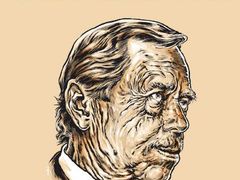IS HE IN OR IS HE OUT? The long-running speculations about the uncertain future of Jan Švejnar's presidential bid have been definitely put to rest last Saturday after the main opposition Social Democratic Party (ČSSD) gave him its full support in an inner-party vote.
That makes the upcoming elections, to be held February 8 next year, all the more interesting with the incumbent Václav Klaus suddenly sliding to a number two position.
Using all the available information, we at Aktuálně.cz see the current score as 127:126 in favour of Jan Švejnar.
How did we get that particular break-down? Well, there are 281 lawmakers in the two chambers of the parliament, who will be electing the new (?) head of state.
With 122 Civic Demorats (ODS) earlier pledging their support to the founder of their party and its chairman emeritus Mr Klaus, and two independent senators plus two deputies from the ODS-run coalition Christian Demoratic Party (KDU-ČSL) doing the same, Václav Klaus has 126 votes he can count on.
As for Jan Švejnar, he can now bet on 85 ČSSD lawmakers supporting him together with 29 communist MPs who made it clear they prefer him over Mr Klaus - at least in the first round, as they told Aktuálně.cz.
Greens, who have six seats in the Chamber of Deputies, were always behind Švejnar in fact, it was their idea that he ran. And there are also two KDU-ČSL senators supporting Švejnar's bid, as well as five more upper chamber members. Altogether 127 votes.
It leaves votes of no more than 28 members of the electoral college available for either of the candidates and with the race being neck and neck at this stage, expect some serious political back-dealing in the coming weeks.
--
Last week has been a busy one not only for the sitting president and his possible successor but also for his predecessor (and a long-time political and ideological rival), Václav Havel. Politics had little to do with it, though, at least on the surface.
Havel found himself embroiled once again in a circus surrounding the attempts to stage first play he has written in nearly two decades. Many critics swear that Odcházení (Leaving), as it is called, is Havel's best play ever.
And it is certainly his most anxiously awaited piece to date, thanks partly to the shenanigans preceding the expected premiere. After second theatre in less than a year pulled out of staging Havel's latest offering, the play was immediately snapped up by Prague's Archa Theatre
"I have returned to what I thought when I was writing the play. That it belongs to a mid-sized theatre," the ex-president and playwright told Czech Television on Thursday after it was confirmed that Archa, which has hosted many local and international productions of mostly progressive leaning, will indeed go down the history as the place where the world premiere of what is Václav Havel's official return to playwriting will have taken place. Hopefully.
--
If you are braving the crowds in search of Christmas gifst these days, you may find it hard to believe that shopping (well, living too) is getting more expensive in the Czech Republic.
Compared to a year ago the November inflation rate rose 5%, which is the highest inflation rate since August 2001. The growth of consumer prices was mainly spurred by the 4% food and non-alcoholic beverage price increase, the highest month-to-month price hike since January 1993.
The news was somewhat offset by another set of data showing that the unemployment rate in the Czech Republic dropped to 5.6 % in November. On month-to-month comparison it is the biggest decline since 1991, said the Ministry of Labor and Social Affairs.
The ministry has one more reason to celebrate: There are now 40 per cent less households falling into the "poor" category in the Czech Republic than there were a year ago with the state saving 6,5 billion Czech crowns on social welfare, according to the information available to Aktuálně.cz.
Now, somebody better tell the United Nations the recipe for tackling the global poverty has finally been found. Apparently, all you need to do is take a closerr look at the pauper-posers. Are they really poor, or are they just faking it? Not quite sure if this would work in places like sub-Saharan Africa, mind you.









